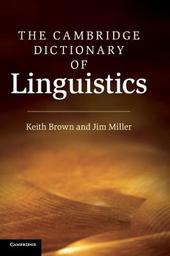
|
The Cambridge Dictionary of Linguistics
Hardback
Main Details
| Title |
The Cambridge Dictionary of Linguistics
|
| Authors and Contributors |
By (author) Keith Brown
|
|
By (author) Jim Miller
|
| Physical Properties |
| Format:Hardback | | Pages:492 | | Dimensions(mm): Height 244,Width 173 |
|
| Category/Genre | Dictionaries
linguistics |
|---|
| ISBN/Barcode |
9780521766753
|
| Classifications | Dewey:410.3 |
|---|
| Audience | | Tertiary Education (US: College) | | Professional & Vocational | |
|---|
| Illustrations |
6 Tables, black and white; 37 Line drawings, black and white
|
|
Publishing Details |
| Publisher |
Cambridge University Press
|
| Imprint |
Cambridge University Press
|
| Publication Date |
5 December 2013 |
| Publication Country |
United Kingdom
|
Description
The Cambridge Dictionary of Linguistics provides concise and clear definitions of all the terms any undergraduate or graduate student is likely to encounter in the study of linguistics and English language or in other degrees involving linguistics, such as modern languages, media studies and translation. lt covers the key areas of syntax, morphology, phonology, phonetics, semantics and pragmatics but also contains terms from discourse analysis, stylistics, historical linguistics, sociolinguistics, psycholinguistics, computational linguistics and corpus linguistics. It provides entries for 246 languages, including 'major' languages and languages regularly mentioned in research papers and textbooks. Features include cross-referencing between entries and extended entries on some terms. Where appropriate, entries contain illustrative examples from English and other languages, and many provide etymologies bringing out the metaphors lying behind the technical terms. Also available is an electronic version of the dictionary which includes 'clickable' cross-referencing.
Author Biography
Keith Brown is an affiliated lecturer in the Research Centre for English and Applied Linguistics at the University of Cambridge. He taught linguistics at the University of Edinburgh from 1965 to 1979 and then at the University of Essex. He is a former chair of the LAGB and President of the Philological Society. His major research interest is in English grammar. His previous publications include Syntax: A Linguistic Introduction to Sentence Structure, 2nd edition (with Jim Miller, 1991) and he is Editor-in-Chief of the Encyclopedia of Language and Linguistics, 2nd edition (2005). Jim Miller is Professor Emeritus at the University of Edinburgh. He taught linguistics at the University of Edinburgh from 1967 to 2003 and at the University of Auckland from 2003 to 2007. His major research interests are the grammar and discourse organisation of spontaneous spoken language and how they differ from written language, and grammatical categories, especially case, tense and aspect. He is the author of A Critical Introduction to Syntax (2011) and Spontaneous Spoken Language: Syntax and Discourse (with Regina Weinert, 2009).
Reviews'Just what any novice needs. The definitions are brilliantly clear, and the book's 3,000 entries cover the entire field from AAVE to Zapotec and from A-bar-binding to Zero morph.' Richard Hudson, University College London 'Nothing in the study of linguistics is more challenging than the mastery of its complex terminology. That's why every serious student of the subject should have a copy of this dictionary.' Heinz Giegerich, University of Edinburgh 'The most comprehensive glossary available for anyone with more than a passing interest in language. Concepts and terms from the major theoretical and methodological approaches to linguistics are covered with precision and clarity. Invaluable for teachers and students alike.' Miriam Meyerhoff, University of Auckland 'The Dictionary is admirably concise and comprehensive. The definitions are clear, carefully illustrated and cross-referenced, and the etymological information on the more opaque technical terms is a special bonus. This user-friendly reference tool will be welcome by all who like or dislike linguistic terminology.' Donka Minkova, University of California, Los Angeles '... an impressive work which could become the first port of call for any beginning linguistics student.' Val Hamilton, Reference Reviews 'Students of linguistics will find it especially helpful as they are constantly attempting to remember the new terms they encounter. Missionaries and translators might find the dictionary handy as they continue to read linguistic literature and need refreshers on terminology and theories. Scholars may find the volume useful for short, citable definitions.' Todd A. Scacewater, Journal of Language, Culture, and Religion
|